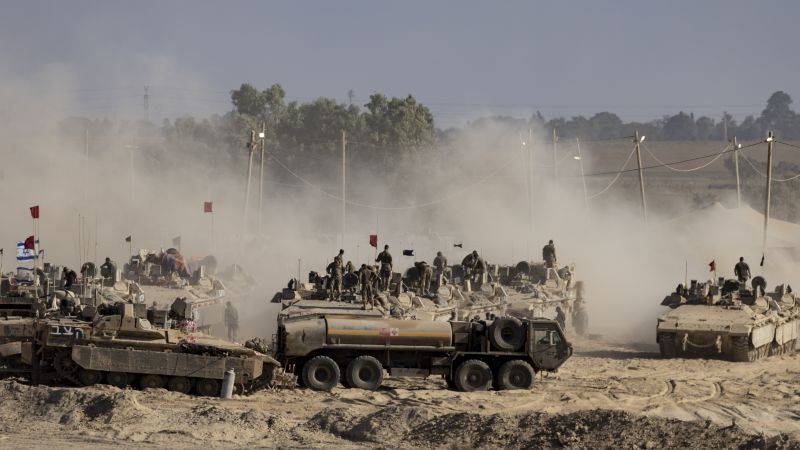Hamas says it has agreed to a new ceasefire proposal from mediators for the war in Gaza, but details of the proposal remain unclear.
Basem Naim, a senior member of Hamas’ political bureau, said on social media, “The movement has accepted the new proposal from the mediators. We pray that God extinguishes the fires of this war on our people.”
It’s unclear to what new proposal Hamas is referring and who put it forward.
An Israeli official told CNN that Israel had received the Hamas response from mediators.
According to a diplomat briefed on the negotiations, Qatari and Egyptian mediators secured a breakthrough that preserves 98% of the last proposal from US envoy Steve Witkoff, to which Israel had previously agreed. The mediators put pressure on Hamas to accept the proposal.
This step opens the way to reaching a comprehensive agreement in the best possible manner without endangering the lives of the hostages through further intense military operations and avoiding a worsening of the humanitarian situation for the people of Gaza, who are already suffering greatly, the diplomat said.
The proposal entails a ceasefire during which Israeli forces redeploy to the lines specified in the Witkoff proposal, while humanitarian aid flows intensively to meet the basic needs of the population in Gaza. During this period, a number of Palestinian prisoners would be exchanged for half of the Israeli hostages being held in Gaza.
This step marks the beginning of the road to a comprehensive solution, the diplomat added.
A second diplomat involved in the negotiations said, “Given the developments, Egypt and Qatar will extend an invitation to Steve Witkoff to come to Cairo.”
Qatari Prime Minister and minister of foreign affairs Sheikh Mohammed bin Abdulrahman Al-Thani arrived in Egypt for discussions about ceasefire negotiations, Egyptian officials said Monday. Qatari officials met with Witkoff last weekend in Spain.
The most recent ceasefire negotiations focused on a 60-day ceasefire and the release of approximately half of the remaining 50 hostages, 20 of whom are believed to be alive. But the negotiations, which started with marked optimism, fell apart in late-July when the United States and Israel withdrew, accusing Hamas of not negotiating in good faith.
The most difficult issues in the negotiations included the number of Palestinian prisoners to be released in exchange for the hostages, the size of the Israeli buffer zone around Gaza, and the scope of the Israeli withdrawal during the ceasefire. Hamas also demanded a comprehensive end to the war, which Israel has refused.
After the collapse of the last round of negotiations, the US and Israel indicated they would harden their positions, only accepting a comprehensive deal instead of a partial agreement.
On Monday, US President Donald Trump said on social media, “We will only see the return of the remaining hostages when Hamas is confronted and destroyed!!! The sooner this takes place, the better the chances of success will be.”
Israel’s Prime Minister Benjamin Netanyahu said on Monday evening, “Like you, I hear the reports in the media – and from them, one thing is clear: Hamas is under immense pressure.”
He did not say whether he would consider a new proposal after insisting that Israel would only agree to a comprehensive deal that achieved his maximalist positions. He has said that any agreement needs to include the disarmament of Hamas, which has been a red line for the militant organization.
This fresh proposal comes after hundreds of thousands of Israelis demonstrated in Tel Aviv and across the country on Sunday, demanding that Israel agree to a deal to secure the release of the remaining hostages and end the war. In a series of events that lasted all day, protesters blocked major intersections across the country, carried out a grassroots strike, and held a massive rally in Hostages Square.
Netanyahu’s far-right allies, who have demanded an escalation of the war, warned the Israeli premier about accepting a ceasefire deal.
Minister of National Security Itamar Ben-Gvir said in a recorded video: “Mr. Prime Minister, I’ll make this short and simple: you do not have a mandate to go for a partial deal. The blood of our soldiers is not to be disregarded. We must go all the way — to destroy Hamas.” Ben Gvir quit the government over the last ceasefire in January before rejoining when Israel resumed the war two months later.
But opposition politicians immediately threw their weight behind Netanyahu and behind the latest ceasefire effort.
Former Defense Minister Benny Gantz, who chairs the Blue and White Party, said in a statement, “The government has a clear majority and a broad safety net to bring the hostages home. Netanyahu, this is not a time to hesitate — this is a time to make the right decisions for the people of Israel and the security of Israel.”
This is a developing story and will be updated.

